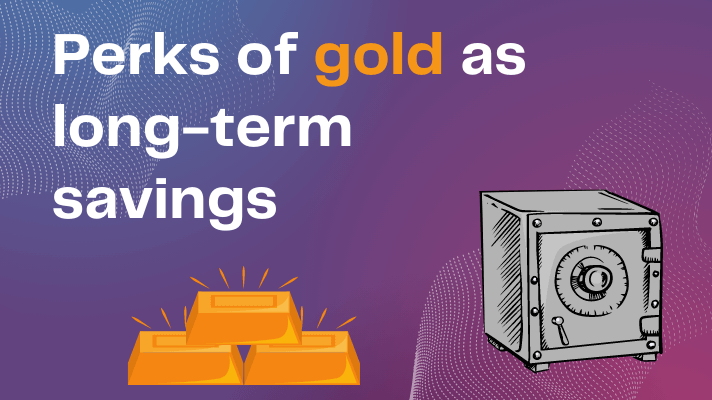The perks of gold saving
As mentioned earlier, gold is my go-to format for long-term savings (not forgetting my other physical assets, too) instead of keeping cash in the bank. Why may you ask? The following are the reasons why:
- Their value is protected over the long term
- Easily liquidated
- Affordable asset
- The wealth is in our hands
- Mobile asset
- No one has to know
The value is protected over the long term
This feature is best described using the example described profoundly from the life of Prophet Muhammad (PBUH). About 1400 years ago, one dinar (4.25g) was paid in exchange for a goat. Even today, the value of one dinar can surprisingly still be exchanged for a goat. Here, we must appreciate the variety of goat breeds and what not, but the point here is that value recorded long back can be experienced even today. This indicates that the purchasing power was retained even after all these years.
This situation is entirely the opposite of our paper money, though!
When I was in primary school back in the 1990s, I used to get RM1 as pocket money. You know what? Let’s do this experiment. Try giving RM1 to your children today as pocket money (those in primary school, especially) and tell them to save the ‘extra’ money. I am very sure they will give you a look that you will never forget!
The exact amount of pocket money that was sufficient for me 20 years ago is now worth way lesser and insufficient for our children. That is how our cash ‘evaporates’ in value. On the contrary, gold does not ‘evaporate’ even after a long term and retains its’ purchasing power.
Some might say that the price of goods and services has gone up over the years, leading us to pay more money, am I right?
Paying more money is good news, right?
The very reason we need to pay more indicates our money losing value. Therefore, we paid more money to obtain similar goods or services. Interestingly, this concept does not apply to gold. The ratio we discussed earlier regarding 1 dinar to a goat is true across time. The underlying reason for this phenomenon is that the value of gold is based on its weight and purity. No third-party guarantee is needed to support their value.
The paper money is incompetent in holding value because its value is based on the guarantee exerted by the government. The value might change depending on the economic instability and political conditions.
Another vital aspect regarding gold as an asset is that gold can never go to zero. It has no expiry date, cannot be damaged by fire, and is still valuable even in powder form. In essence, it cannot be created nor destroyed.
Other forms of assets like real estate, though they seem solid, are also exposed to the risk of being worthless. Just look at those high-rise condominiums that have fallen due to poor structure (i.e., Highland Towers) or at geographical locations where political instability is rampant (at war-risk zones, for example). The risk is so high that owning such properties or land does not add value to our portfolio. Hence, why bother?
Easily liquidated
Come to think of it; gold is just another form of money. It is a physical asset that is easily liquidated. Whenever we feel a crunch in our budget, we can either sell the gold items or pledge for cash (pawning) and get our money in a short time.
The gold items can be sold whenever you wish, and it is accepted worldwide. So, if we need an extra budget for our overseas’ trip, perhaps bringing along our gold bars might be helpful. Historically, gold also was used for trading between ancient kingdoms/governments and hence serves as international money (irrespective of time and country boundaries).
Affordable asset
In addition to gold, property and real estate are other forms of physical assets worth holding for the long term. These assets would indeed appreciate as compared to our paper assets. The only caveat with these assets is they are not budget-friendly. The price of properties and real estate may appear in square foot denomination, but who buys only one square foot of land? This means that huge capital is required to acquire such assets.
On the contrary, gold savings can be initiated with a reasonably small budget, as little as one gram. This can be done monthly using the ‘1 gram per month’ concept, and we can set this aside like a forgotten saving. Eventually, we would end up with 12 grams of gold after consistently doing so for 12 months. Such gold savings programs (by Public Gold and a few other banking institutions) are available to us is an excellent opportunity that we should utilize to our advantage.
The wealth is in our hands
When we convert our savings/paper money into gold, the good news is that wealth is safe in our hands, no longer dictated by third parties, regardless of economic or political turmoil in the said geographical settings. The value of gold stands strong on its own, depending on its weight and purity.
Other assets, however, are dependent on a variety of external factors.
The paper money is never dependent on the same paper it is printed on. For instance, if we cut the SGD100 bill into two pieces, they do not become SGD50 + SGD50; rather, the value drops to SGD 0. This is also true if the bills have scribbles on it. Perhaps keeping them protected in a close-tight container under your bed might do the trick, am I right?
I am afraid not, dear friends. Even paper money (or coin money, for that matter) has an ‘expiry’ date. In Malaysia, for example, we used to have RM1 coins, and now they are no longer in use, while in India, Prime Minister Modi announced that Indian Rupee 500 and 1000 bills were not recognised. The chaos that took place was not a good sight. Imagine what people who worked so hard and saved their money in such denominations feel upon hearing this news? The article regarding this can be accessed here: https://www.theguardian.com/world/2016/nov/08/india-withdraws-500-1000-rupee-notes-fight-corruptionWealth is not in our hands
This further strengthens the notion that the so-called wealth in paper money is not in our hands even if we have the actual cash. On the contrary, their value is dictated by the authority or the government. In other words, the value is ‘forced’ upon the piece of paper (even if it costs just a fraction of a dollar) with the statement as follows:
‘This Note Is Legal Tender For All Debts, Public, and Private’
(Based on Federal Reserve Note, United States of America)
‘This Note is Legal Tender’
(Based on Monetary Authority of Singapore)
Such backings by the government are only valid as long as the political and economic conditions of the said countries are stable. Once the conditions become unstable, the value imposed on all these papers will be a huge question mark.
Therefore, having our wealth in cash is virtual wealth simply because the wealth is not in our hands despite having actual paper money. This brings us to what Robert T Kiyosaki, the famous financial expert, says about money. He calls it ‘funny money’ since paper monies are not backed by any asset whatsoever. He also says that “Savers are Losers,” again indicating that storing our wealth in the form of paper money would eventually contribute to loss of value. Simply put, paper money has no store of value capability.
Mobile asset
Gold is a mobile asset that can be easily carried around compared to other assets we have seen prior. Real estates or property are not portable. Even the selling part for such assets is not as easy as we think. The process is time-consuming (between six to nine months, provided all other requirements are in place) and involves numerous legal requirements to get completed.
During the Vietnam War in the 1970s, the Vietnamese people had to leave their beloved home country as it was no longer safe. They sold their property and converted it into Vietnam ‘Kim Thant’ gold. These gold plates are thin and easily kept in between clothes’ folding. When they reached a new place, they utilized the gold plates to start a new life.
Since gold is valuable anywhere, they would just cut small pieces of gold based on their need and exchange them for goods and services. Just imagine if they had brought over their currency instead of gold. Do you think they were able to buy any goods and services? Most likely, no. Hence, gold plates have saved them from financial restrictions.
No one has to know
When we keep our savings in gold, we are not obligated to inform any party, including the authorities. According to Robert Kiyosaki, gold (and silver) are financial tools that are not involved/recorded in financial records and monetary systems.
With such perks, even a person who has been declared bankrupt can still save gold and will face no financial consequence. While the same person may not be able to open a bank account, apply for a loan, start a business, etc.
The only issue is that we must be alert in letting our family members know where to look for the gold savings should something happen to us. There was an incident where a fisherman had saved over MYR 2 million worth of gold, and he made the mistake of not informing his family member. The gold was never to be found, and this mistake is something that we need to avoid.
If you find this article useful, consider sharing this with your friends and family. Let's create awareness about our money because nobody will come forward to help us.
Easy way to start gold savings can be found here: Gold Accumulation Program
Join my Facebook page for free here: FB page
Hope you find it useful.
Your buddy on gold investing,
Naresh G

